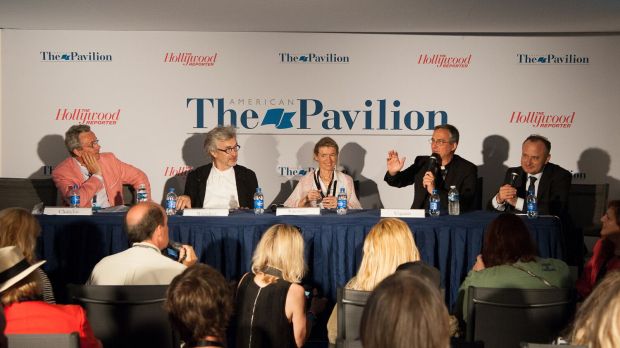Something new happened at the 70th Cannes Film Festival. Among those in attendance was the man to whom Pope Francis has entrusted the task of unifying and reforming Vatican Communications, Monsignor Dario Viganò.
As journalists and representatives from the cinema world have pointed out, it was a gesture that signals a new relationship between spirituality and the seventh art that is no longer polemical but one of common responsibility.
Monsignor Viganò, Prefect of the Holy See’s Secretariat for Communications, was in Cannes for the “Sacré de la Beauté Festival” [Sacred Festival of Beauty] promoted by the “Diaconia of Beauty.”
Aleteia sat down with the priest, film expert, and trusted man of Pope Francis, and asked him several questions. Here is what he said.
What does film mean to Pope Francis?
During his recent journey to Milan, Pope Francis spoke about film and cinema with young people preparing to receive the sacrament of confirmation. Recalling the famous 1943 film by Vittorio De Sica, The children are watching us [I bambini ci guardano], the pope called that film, and many of the films made after the war, a “true ‘catechesis’ on humanity” (Milan, March 25, 2017), because of their power to tell the story of hardship together with hope, of misery coupled with redemption.
In this sense, do you believe that film has a role in society?
Indeed, film has a significant role in society, as media, but above all as art. Film has the ability to portray reality up close, moving deeply into the karstic folds of human life without escaping complex or problematic issues. But film must not forget to be the bearer of another vision, and to open our horizons to great vistas of light.
You came to Cannes to bear witness to the value of spirituality in film …
Film is capable of venturing into the invisible, and of capturing manifestations of God’s mercy in the the stories of men. I think of the poetic work of Robert Bresson, from The Diary of a Country Priest (Journal d’un curé de campagne, 1951) to Au hazard, Balthazar (1966) [Balthasar, at Random]. In the latter film, he discovers the image of Jesus in a poor donkey that is beaten and dragged to death like Christ.
I could also cite La strada (1954) by Federico Fellini, a film dear to Pope Francis. In this film, the innocence of the young Gelsomina shines as she naively faces life, and defies the barbarity of Zampanò. Film is an outward gaze, a look that holds the unseen within the confines of image: it shows us its own limits and pushes us to go beyond them.
Why is the Church’s presence at a festival like Cannes important?
At the Cannes Film Festival, great artists have offered viewers, and the world, films capable of breaking into the lethargy of everyday life, and of recalling the importance of social inclusion and mercy.
How can one fail to think of winner of the 2016 Golden Palm award — I, Daniel Blake, by Ken Loach — an English director who has always been on the forefront of telling stories about the peripheries of human life, about the condition of the working classes, that sub-proletariat that also interested Pier Paolo Pasolini. In I, Daniel Blake, Loach heralds an appeal against the inhumane face of bureaucracy, that most often crushes those who are already poor and defenseless. In narrating this, however, Ken Loach also brings us a story of hope, the hope that ignites through mercy, through giving to the other, for the good of the other.
This same outlook emerges in the works of the brothers Jean-Pierre and Luc Dardenne, who triumphed at the Cannes Festival with Rosetta (1999) and then L’Enfant (2005). Among their films, to be honest, there is another film competing on the Croisette that I am particularly fond of: Two Days, One Night (Deux jours, a nuit, 2014). The film tells the stories of “discarded” workers: of Sandra, who is dismissed as soon as she returns to work after dealing with depression. Sandra is let go because she is no longer considered useful. She is thought to be unproductive because she fell ill, and so she “fails.”
The Dardennes do not hold back on hardness, and in showing us all the coldness of a working world that little by little loses all its humanity. Yet, at the same time, they also trace a journey of ascension, of redemption, through the decisive role played by emotional ties and by family, which is a real bastion amid the storms. There, everything gets a new start, and from there the colors of the possibility shine forth.
At the Festival’s American Pavilion, journalists and film industry representatives publicly emphasized how your presence at Cannes changes the attitude in the Church-Cinema dialogue: from a vision that is frequently polemical to one characterized by collaborative relationship. We all need hope.
The pope speaks of the urgent need to communicate hope in his Message for the World Day of Social Communications, which we celebrate this Sunday, May 28.
“Communicating hope and trust in our time” is the title chosen by the Pope for the 51st World Day of Communications. By it he means to call everyone who works in media and news, the whole community, to become promoters of truth and honesty, without losing confidence in today or tomorrow.
As the pope states in that message, he wants to “contribute to the search for an open and creative style of communication that never seeks to glamorize evil but instead to concentrate on solutions and to inspire a positive and responsible approach on the part of its recipients. I ask everyone to offer the people of our time storylines that are at heart ‘good news.’” This is what we always expect from good films.

